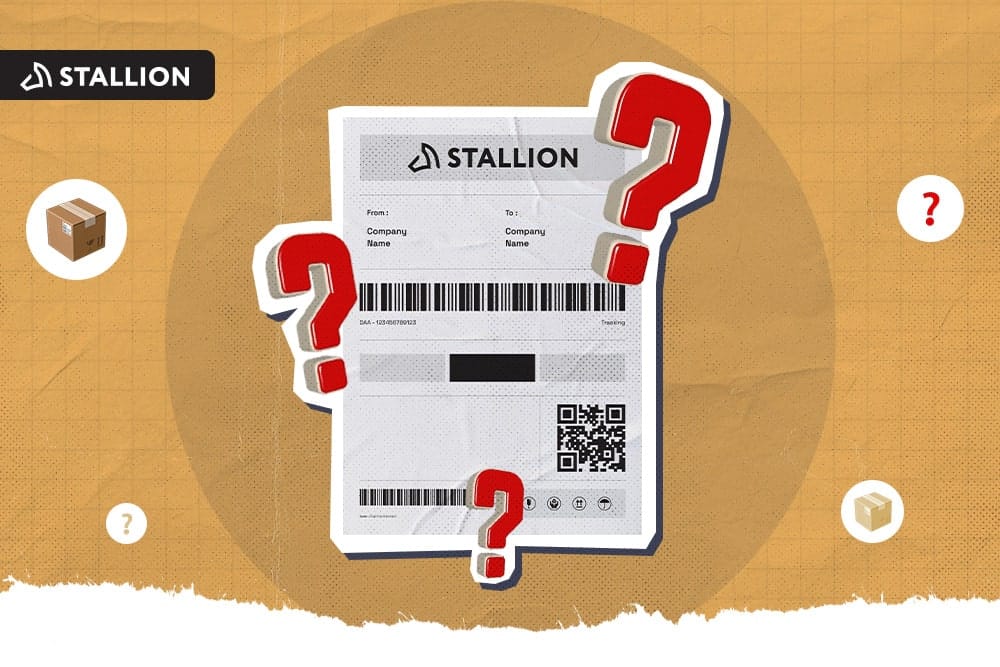
According to Oberlo, the number of digital buyers since 2014 has shown consistent growth from an estimated 1.32 billion people to 2.05 billion in 2020. This data means that, in 2020, about 27% of the world's population order online. As a result of the recent pandemic, more brands also continue to shift their focus to e-commerce to reach more audiences. It's safe to say that e-commerce is a perpetually flourishing industry and may become the "new normal."
As an e-commerce entrepreneur, there are various factors to consider for ensuring advantages and quality in such a competitive industry. You spend valuable time and effort trying to create the best product possible, but as soon as you ship your products, things are entirely out of your control. Therefore, finding the right e-commerce shipping options become valuable to maintain a robust customer base, drive sales, and influence higher returns.
This article talks about the most valuable lessons that you can learn from our experience with e-commerce shipping. We've got you covered by creating proper shipping strategies and calculating costs to find the correct package options or shipping and receiving services.
The concept of e-commerce shipping is relatively straightforward. It deals with the transport of all retail products purchased online from a merchant to a customer's designated destination. Finding the right shipping partner for e-commerce may take time, but it will make the process quick, affordable, and reliable when done right.
The e-commerce shipping industry has continued to surge with the rise of online selling platforms, including Amazon and Walmart, and a plethora of B2B and B2C firms have begun to join in on the bandwagon. Most small-sized businesses try to keep things simple either by displaying reduced shipping rates or by offering free shipping options altogether. If you want to take your e-commerce business to the next level, though, you have to start organizing a proper shipping strategy to maximize your profits.
The quote "failing to plan is planning to fail" may sound like a broken record for most people. However, it becomes increasingly appropriate to use when businesses attempt to dial in on their key strategies, especially when they're trying to streamline their ecommerce shipping process.
While there is no single recipe for the best shipping strategy out there (whether for retail or bulk shipping solutions), there are some key indicators you can follow to successfully lay the foundations of your shipping. You have the freedom to tweak things up a bit later on, but these are the crucial steps to take when you start creating your strategy:
The first step is to figure out how much you will charge customers for shipping. Will you offer free shipping, charge standard carrier rates, or provide a flat rate? It's entirely up to you.
Product weight plays a significant factor in organizing your shipping process. If you are starting, we recommend measuring the exact weight of your product, so as to have a ballpark figure of how much your shipping costs will be.
You can subsequently have first-hand information to give out to your customers even before your first order gets shipped.
The right packaging for a product depends entirely on the seller's personal preferences, but it does play a part in calculating shipping costs later on. You can either of the two methods:
Now that you have a clear idea of how your shipping process works, it's now time to do your calculations. Which shipping service is cheapest?
A product's size, weight, and location are some of the general rules that shipping companies follow to establish their shipping rates. Most shipping couriers nowadays offer identical prices to remain competitive (with the exception of tracking and insurance fees), and it always pays to go through their respective shipping calculators first to ascertain your exact shipping costs.
There are also certain caveats for each shipping service available in the market. For instance, can you ship alcohol via US postal service? The answer is no, but other shipping companies like UPS or FedEx follow certain regulations for people to be able to ship alcohol.
Doing research and calculating costs beforehand will give you a clearer picture of your shipping costs and understand how much you will eventually earn in your business, so it's best to as early as you can.
Any logical e-commerce business would know that analyzing profit margins is a critical factor to achieve success. Your e-commerce business should be able to calculate how much it will earn after shipping costs are taken into consideration.
Since shipping is a huge business expense in itself, failing to do proper calculations will result in your business losing money.
Like we've mentioned, packaging plays a more crucial role in e-commerce shipping than most first-time sellers think. When e-commerce was at its early stages back in the day, people thought of packaging simply as a means to hold a delivered product. Nothing more.
A lot more people now are looking into the additional experiences that come with their product's packages. In fact, the unboxing experience has been an ongoing trend among e-commerce enthusiasts— they document how they unbox their packaged goods and show how businesses go above and beyond to impress their shoppers.
If a business does an exceptional job with its packaging and treats it as a delicate part of the business brand, it is effectively reinforcing its marketing efforts through its customers. Here are some ways to produce better packaging:
High-quality materials speak for themselves— they immediately catch the attention of a customer and bring you bonus points. Some common packaging materials include paperboard, fiberboard, and wood, but you can be creative and explore other materials to make your products look unique. If you decide to package your products using sensitive materials, make sure you include precautionary signs on your labels.
It is also important for you to keep your packaging lightweight. You can either use corrugated cartons or utilize foam inserts, and have your packaging match the same shape and size of your product. It's minimalist, aesthetic, and saves you money if you do it correctly.
Designing a product package can be a fairly straightforward process, but making the effort to stand out among competitors requires a brand to undergo a strategic design phase. Among the most useful tips to differentiate your packaging would be using recycled materials or including a personal "thank you" note for customers.
Unforeseen product damage and loss are some of the risks that come with shipping retail, and the worst thing that can happen to an e-commerce business is having its products compromised without insurance. Shipping insurance is typically affordable and easy to avail, since most shipping couriers already have it as an extended feature in its services.
You must be aware, however, that there are terms and conditions that come with availing shipping insurance. For instance, some shipping companies do not accept coins, jewelry, and cash for insurance, while others only provide insurance in certain locations. They can also reclaim insurance coverage if they conclude that a product wasn't packed well, so make sure you properly pack your goods.
As long as you are aware about these caveats and do your research beforehand, you should be able to enjoy the benefits of shipping insurance.
The final step before sending out a parcel is labeling the package. Some small businesses tend to write the to-and-from addresses by hand, but this poses numerous problems and is not a sustainable practice— your penmanship might be unclear, the process is time consuming, and is not ideal if your business is projected to grow.
From a customer perspective, nothing is more frustrating than a parcel with A+ marketing and packaging, but with an unattractive and unreadable label. Therefore, as a seller, the best practice is to follow these steps:
A significant number of e-commerce sellers today haved transitioned to third-party fulfillment services to manage their e-commerce shipping needs.
By definition, third-party fulfillment services are warehouses where businesses can store their products and have them shipped on their behalf. Maybe you're the type of seller who doesn't want to worry about anything related to shipping, or maybe your brand has grown to a point where your current warehouses aren't fit for your products anymore. Whatever the case may be, you can look into hiring third-party fulfillment providers to do the job for you.
Like most things, however, the third-party fulfillment approach has its own set of pros and cons. For instance, third-party fulfillment may be able to take care of your shipping needs, but your inventory is at risk of being disorganized or mismanaged.
Check out the following risks and benefits you can encounter when you decide to hire third-party fulfillment services:
The first pro, as we have mentioned in the first part of this section, is that third-party fulfillment services take care of your shipping needs, and therefore allow you to shift your focus on other parts of your business operations. It's convenient and reliable for both B2B and B2C-type firms, which explains why so many e-commerce sellers go for it these days.
The level of convenience that you enjoy comes at a cost, and it can be a pretty heavy one especially for starting businesses. Most third-party fulfillment programs charge a commission fee between 15% to 18% for each product sold. Sellers also have to take into consideration any additional warehouse and item removal fees, among other penalties that may be incurred once enrolled in the program.
In addition to shipping management, most third-party fulfillment service providers also take care of any customer service and item return management concerns. They usually have telephone hotlines where customers can speak with representatives or item returns centers where they can physically give their item back. It's especially beneficial for businesses who want to worry less about administrative concerns and prefer to focus on their operations.
The major downside to this service, however, is that a fulfillment provider's fault may reflect on the image of your company’s brand. In case you choose to hire a third-party fulfillment company with bad service, customers will most likely leave bad reviews about you and not your service provider. After all, it's your brand name that they can see on their product.
You can produce the best products made available to man, but it's the shipping process that allows your customers to experience your product. The reality is, customer reviews highly depend on their shipping experience: how fast it gets to them, and if everything remains intact. The shipping process might feel like handing over your products to people you don't know and not knowing what to expect, so it's better to invest in a shipping company with first-rate handling and strategy. Choosing the right shipping partners for ecommerce is vital in keeping your clients satisfied and ensuring your business' stability.
Whether you are just starting out or you already have experience with the e-commerce industry, these lessons will definitely help you kickstart your way into success and differentiate yourself from your competitors. By following these tips, you are helping your company avoid shipping problems in the future that may have severe repercussions on your overall business.
If you're looking for a reputable shipping company, Stallion Express has a team of esteemed shipping professionals who can handle your shipping duties, all for a fair price. Book an appointment today!
Aman looks after the content marketing department at Stallion Express. He is passionate about helping businesses grow by providing informative and up-to-date trends in the eCommerce industry. Outside the office, you can find him on the soccer field cheering on Real Madrid.



Can our fellow Torontonians relate?
-
#smallbusiness #business #entrepreneur #socialmedia #shipping #ecommerce #canadianecommerce #shopify #poshmark #b2b #saas #etsy #ebay #canada #canadiansmallbusiness #shoplocalcanada #entrepreneur
#toronto

Here’s your quick hassle free shipping from 🇨🇦 to 🇺🇸 as a business owner!
-
Any questions?! Leave them 👇🏻 and save this video so you don’t forget!
-
#smallbusiness #business #entrepreneur #socialmedia #shipping #ecommerce #canadianecommerce #shopify #poshmark #b2b #saas #etsy #ebay #canada #canadiansmallbusiness #shoplocalcanada #entrepreneur

Meet @drinkbenny a 🇨🇦 female founded energy drink brand! Instead of focusing on their products, they’re taking a unique approach by hosting in person events in different Canadian cities to offer an experience for their community 🧡
-
What are your thoughts on in person events? 💭
-
#smallbusiness #business #entrepreneur #socialmedia #shipping #ecommerce #canadianecommerce #shopify #poshmark #b2b #saas #etsy #ebay #canada #canadiansmallbusiness #shoplocalcanada #entrepreneur

Do you know the difference between DDU and DDP when shipping internationally 🌏 ?
-
Questions? Leave them below! 👇🏻
-
#smallbusiness #business #entrepreneur #socialmedia #shipping #ecommerce #canadianecommerce #shopify #poshmark #b2b #saas #etsy #ebay #canada #canadiansmallbusiness #shoplocalcanada #entrepreneur

Here’s a quick hack to save time from choosing multiple postage options
↪️ Turn on the lowest postage rate automation to save you time!
-
Questions? Leave them below! 👇🏻
-
#smallbusiness #business #entrepreneur #socialmedia #shipping #ecommerce #canadianecommerce #shopify #poshmark #b2b #saas #etsy #ebay #canada #canadiansmallbusiness #shoplocalcanada #entrepreneur
